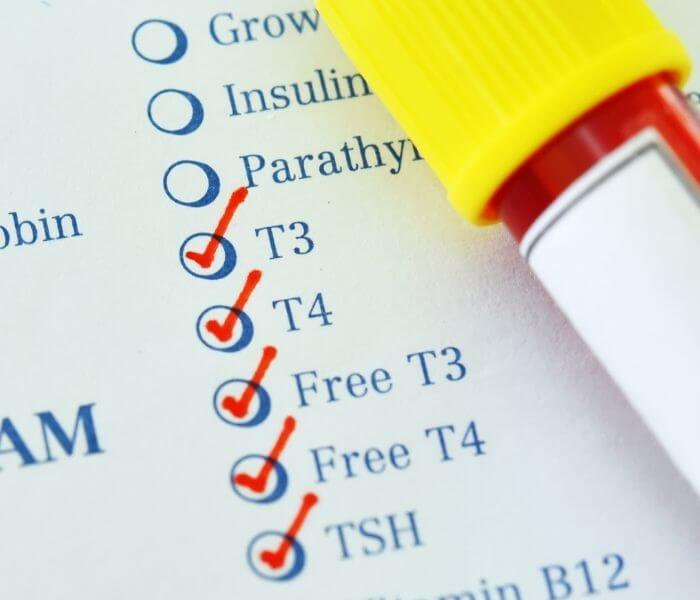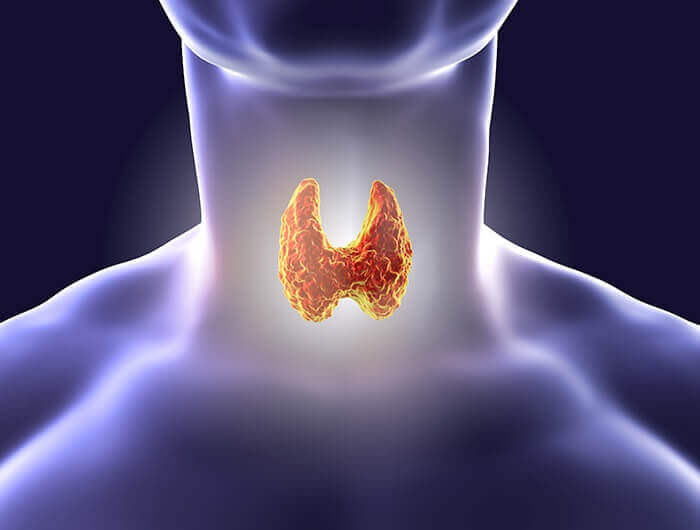5 mins read
How Often Should A Thyroid Test Be Carried Out?

- How Often Should Thyroid Levels Be Checked?
- What Is Measured In A Thyroid Test?
- Treatment Of Thyroid Issues
- What Are They Symptoms Of An Overactive Thyroid?
- What Are They Symptoms Of An Underactive Thyroid?
- What Is A Normal Range For A Thyroid Test?
- How Much Does A Thyroid Test Cost?
- What Is The Role Of The Thyroid Gland?
- Summary
How Often Should Thyroid Levels Be Checked?
How often you check your thyroid function depends if you have been diagnosed with hypothyroidism or hyperthyroidism. It’s recommended you test your thyroid function once a year if you have hypothyroidism, and monthly if you have hyperthyroidism. However, you can test yourself at home with our thyroid blood test kits at any time, whether you’ve been diagnosed or not.
View our Hormone Tests and start your journey to better health today
Hypothyroidism and Hyperthyroidism Testing
If you have an underactive thyroid (hypothyroidism) you will need to have your Thyroid Stimulating Hormone (TSH) levels tested once a year to make sure they are within the normal parameters.
If you have been diagnosed with an overactive thyroid (hyperthyroidism), then your GP may want to test your levels of TSH and FT4 on a monthly basis to see how treatment is going, and then less frequently thereafter. However, the frequency of testing will be discussed with you upon diagnosis and dependent on treatment.
What Is Measured In A Thyroid Test?
The main three hormones that are measured in a thyroid blood test are:
TSH is the most sensitive biomarker for thyroid function and is often used to ensure the hormone replacement therapy you are prescribed is working as effectively as it should.
High levels of T3 and T4 often indicate an overactive thyroid, whereas low levels indicate an underactive thyroid.
Thyroid problems can be identified by measuring the level of free T3 (FT3) in the blood. High levels indicate an overactive thyroid whereas low levels indicate an underactive thyroid.
T3 can be used to:
- test to see if your thyroid is performing properly
- diagnose an overactive thyroid (hyperthyroidism)
T3 is only really requested when diagnosing or testing the severity of hyperthyroidism.
Levels of T4 are often used in conjunction with presenting symptoms to identify a thyroid problem, rather than alone.
There are two additional biomarkers that can be added to a thyroid test, these are:
- Thyroglobulin Antibodies
- Thyroid Peroxidase Antibodies
Thyroglobulin is a protein stored in the thyroid gland and aids the production of T3 and T4. Thyroid Peroxidase Antibodies help to identify autoimmune thyroid disease.
Treatment Of Thyroid Issues
If hypothyroidism (underactive) is diagnosed, you will usually begin taking levothyroxine a synthetic, man-made version of the thyroid hormone thyroxine.
If hyperthyroidism (overactive) is diagnosed, however, treatment options include:
- Antithyroid Drugs
- Surgery to remove some of or all the thyroid gland
- Radioactive iodine to reduce the thyroid’s activity
As mentioned above, when treatment commences, it is likely you will have blood tests on a regular basis, possibly every few weeks to assess your body’s response to treatment. Once the treatment has made your condition stable, the frequency of the blood tests should reduce.
What Are They Symptoms Of An Overactive Thyroid?
An overactive thyroid is a condition called Hyperthyroidism and is where the thyroid is overactive and produces too much of the thyroid hormones.
When too much of the T3 and T4 hormones are produced, the following symptoms can occur:
- Feeling nervous, anxious or irritable
- Weight loss
- Hyperactive
- Mood swings
- Diarrhoea
- Fatigue
- Weak muscles
- Itchiness
- Low sex drive
- Need to pee more often
- Increased thirst
What Are They Symptoms Of An Underactive Thyroid?
Hypothyroidism or an underactive thyroid, on the other hand, is characterised by the failure of the thyroid to produce enough T3 or T4 hormones. As a result, symptoms can include:
- Fatigue
- Feeling cold
- Depression
- Weight gain
- Muscle cramps and aches
- Low sex drive
- Brittle hair and nails
- Dry skin
- Irregular or heavy periods
What Is A Normal Range For A Thyroid Test?
Laboratories use reference ranges when analysing the function of the thyroid. Typical reference ranges for a healthy individual may look like this:
- TSH 0.27– 4.2 mIU/L
- FT4 12.0 – 22.0 pmol/L
- FT3 3.1 – 6.8 pmol/L
Different laboratories use different reference ranges, but if your results fall outside of these parameters you could be diagnosed with hypothyroidism or hyperthyroidism.
Subclinical hypothyroidism, on the other hand, occurs when your blood TSH level is slightly raised but your FT4 is within the normal range.
How Much Does A Thyroid Test Cost?
Private thyroid testing might not cost as much as you expect. And you may also be surprised to hear you can carry out the test itself using a finger prick kit at home, saving the cost and inconvenience of visiting a clinic.
Our private thyroid test is just £49 and tests for Triiodothyronine (T3), Thyroxine (T4) and Thyroid stimulating hormone (TSH).
Advanced Thyroid Blood Test – £65
Our advance thyroid test is £65 and as well as testing for FT3, FT4 and TSH it also tests for Thyroglobulin Antibodies and Thyroid Peroxidase Antibodies.
What Is The Role Of The Thyroid Gland?
The thyroid is located at the front of the neck and consists of two lobes, one on each side of the windpipe and adjoined by a small strip of thyroid tissue known as the isthmus. The three hormones produced by the thyroid are:
- T3 (triiodothyronine)
- T4 (tetraiodothyronine)
- Calcitonin
T3 and T4 are the active forms of the thyroid hormone, thyroxine, and are involved in the regulation of:
- The body’s metabolic rate
- Heart function
- Digestive function
- Muscle control
- Brain development
- Bone maintenance
Summary
Thyroid tests can identify hypothyroidism or hyperthyroidism. How often you repeat these tests depends on your diagnosis, however, you will need a TSH test once a year if you have an hypothyroidism; and more regular tests if you have an hyperthyroidism to identify that the treatment is working. The frequency of testing will be determined by your GP upon diagnosis of your condition.
If you have taken a thyroid test and the results came back within the normal range, then it might be worth retesting every 6 months along side other baseline biomarkers as part of ongoing health optimisation and to identify any changes early on.
- Health scores calculated
Close
This information has been medically reviewed by Dr Thom Phillips
Thom works in NHS general practice and has a decade of experience working in both male and female elite sport. He has a background in exercise physiology and has published research into fatigue biomarkers.

Dr Thom Phillips
Head of Clinical Services
Related articles
Like this article? Here are some more based on similar topics.





